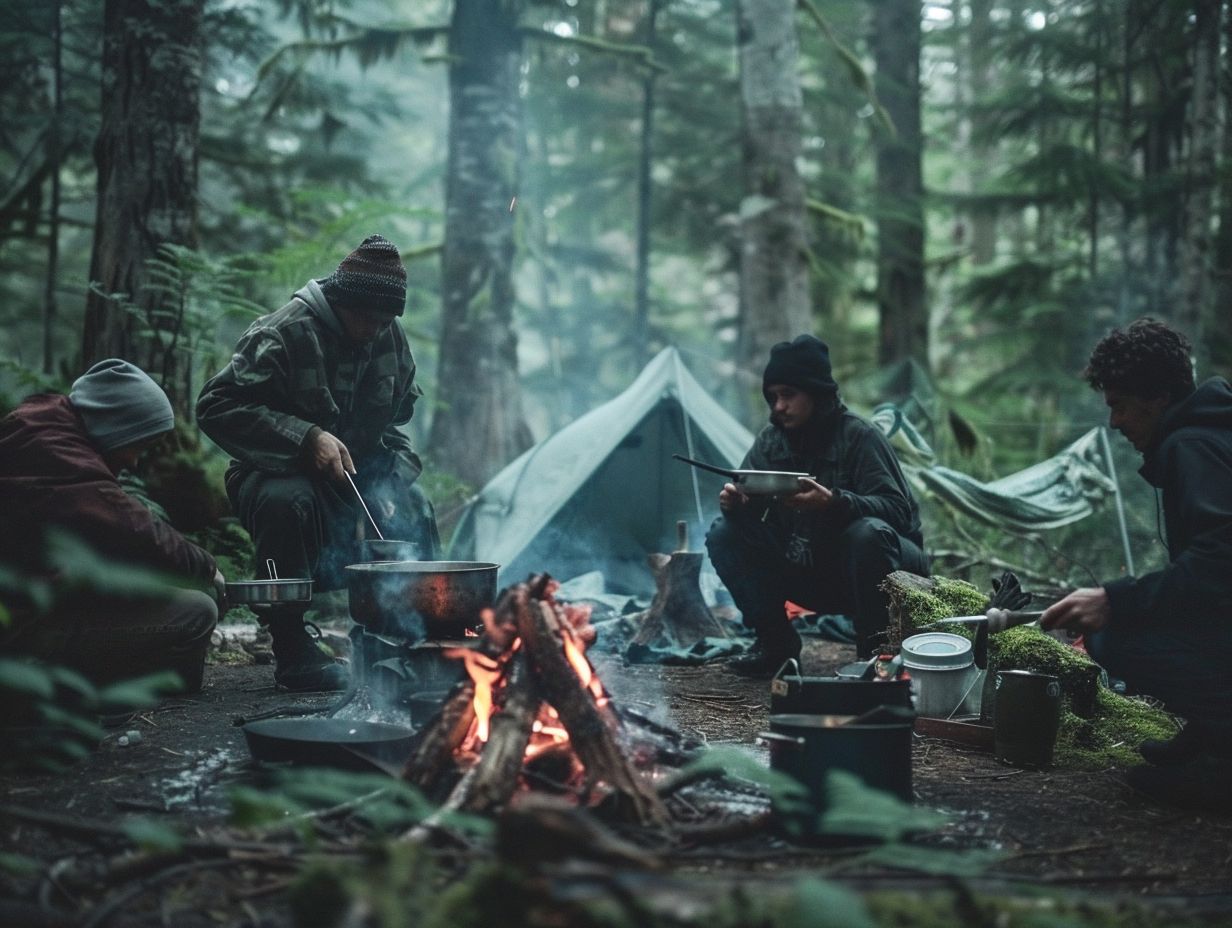If you are seeking to appreciate the beauty of nature while also prioritising environmental consciousness, eco-friendly campfire cooking is an ideal choice.
In this guide, you will delve into the advantages of eco-friendly cooking for the environment and your well-being. You will receive a detailed list of necessary supplies to kick start your eco-friendly cooking journey. Additionally, you will learn valuable insights into preparing for your campfire, utilising sustainable ingredients and techniques for cooking, minimising waste and clean-up efforts, along with crucial safety measures to keep in mind.
Prepare yourself to whip up delectable dishes while simultaneously reducing your ecological footprint!
Key Takeaways:
 1.
1.
- Eco-friendly campfire cooking benefits both the environment and your health.
- Essential supplies for eco-friendly campfire cooking include sustainable ingredients and techniques.
- Choose the right location and fire pit to minimise your environmental impact and ensure fire safety.
Why Choose Eco-Friendly Campfire Cooking?
Opting for eco-friendly campfire cooking practices benefits both the environment and your well-being. This approach not only helps in reducing waste and lessening the impact on the natural surroundings but also ensures that you relish sustainable and delicious meals while on your camping excursions.
When you make use of sustainable equipment and organic ingredients, you are capable of preparing tantalising dishes without causing harm to the wildlife or adding to air pollution. Eco-friendly campfire cooking also encourages a stronger bond with nature, as you procure local produce and cook in harmony with the environment.
Embracing these methods not only results in a tidier campsite but also sets a positive precedent for others to emulate, fostering a culture of responsible outdoor cooking.
Benefits for the Environment and Your Health
Embracing eco-friendly campfire cooking practices offers numerous benefits for the environment and your health. By utilising sustainable ingredients and techniques, you not only reduce waste and carbon footprint but also ensure that you consume healthy and nutritious meals while enjoying the great outdoors.
When cooking over a campfire with eco-friendly methods, you minimise the impact on nature, promoting water conservation and wildlife preservation. Choosing ingredients that are locally sourced and organic not only supports the environment but also provides you with fresher and more flavourful dishes.
Using eco-conscious cookware and utensils further enhances the zero-waste aspect of your cooking experience, making it a truly sustainable and rewarding culinary adventure in harmony with nature.
Essential Supplies for Eco-Friendly Campfire Cooking
To kickstart your eco-friendly campfire cooking journey, you will need essential supplies that prioritize sustainability and environmental consciousness. From reusable utensils to eco-friendly cookware, having the right gear can enhance your outdoor cooking experience while reducing your carbon footprint.
Opt for bamboo or stainless steel utensils that can be used repeatedly, thus reducing the need for disposable plastic cutlery. When considering cookware, it is advisable to invest in cast iron pans or pots made from recycled materials, as they are durable and well-suited for campfire cooking.
Additionally, remember to bring along biodegradable cleaning supplies to ensure that you leave no trace behind after your delicious camping meals. By focusing on sustainable gear and adopting mindful practices, you can savour tasty dishes in the great outdoors while maintaining environmental responsibility.
What You’ll Need to Get Started
Before embarking on your eco-friendly campfire cooking adventure, it is important to ensure that you have the necessary equipment, such as a Dutch oven, portable propane grill, and sustainable camping gear. Stock up on ingredients and utensils that promote zero-waste practices and water conservation during your outdoor culinary endeavours.
Opt for eco-friendly fuel sources like sustainably sourced firewood or natural fire starters to minimise environmental impact.
Consider using reusable containers and eco-friendly cookware to reduce single-use plastics. Bringing along biodegradable soap for cleaning dishes will help maintain the campsite’s ecosystem. Embrace the farm-to-table concept by using locally sourced produce and organic ingredients for fresher and healthier meals.
Remember to pack reusable water bottles and a portable water filter to minimise disposable plastic waste while staying hydrated in the wilderness.
Preparing for Your Campfire

Properly preparing for your campfire is vital to ensuring a safe and enjoyable cooking experience in the great outdoors. When you select a site for your campfire, it’s important to place it at least 15 feet away from tents, trees, and other flammable objects. Clear the area of debris and choose a location with adequate ventilation to prevent smoke accumulation.
Constructing a fire pit using rocks or a metal ring can help contain the fire and minimise the risk of it spreading. Always comply with any fire regulations in the area and refrain from using materials like plastics or treated wood that can emit harmful toxins when burned.
By following these guidelines, you can savour delicious campfire meals while also demonstrating respect for the environment.
Choosing the Right Location and Fire Pit
When selecting the appropriate location and fire pit for your campfire cooking, it is crucial to minimise environmental impact and create a safe cooking environment. Whether you decide on a designated fire pit or utilise a portable grill, it is important to adhere to sustainable camping practices and local regulations to preserve the natural surroundings.
It is advisable to choose a location away from vegetation and maintain a safe distance from water sources to prevent contamination. When using a fire pit, ensure that it is placed on stable ground and never leave it unattended. Opt for dry, seasoned wood to conserve energy and avoid excessive burning.
Cooking methods such as foil packets or skewers can help reduce waste, and make sure to properly dispose of any leftover food scraps.
It is essential to be mindful of wildlife habitats in the vicinity of your campsite, so refrain from leaving any food out and thoroughly clean up after cooking.
Eco-Friendly Cooking Methods
Embracing eco-friendly cooking methods during your camping trips involves utilising sustainable ingredients and techniques that minimise waste and support environmental conservation. When camping, it is essential to consider using natural ingredients and energy-efficient cooking equipment to promote sustainability in your cooking practices.
Experimenting with plant-based recipes can not only help reduce your carbon footprint but also introduce a diverse range of flavours to your campfire meals. Incorporating locally sourced produce and wild herbs into your cooking can enhance the freshness and uniqueness of your dishes while also contributing to the support of local farmers.
Investing in versatile cookware, such as cast-iron skillets and titanium pots, is crucial for outdoor cooking as these items can withstand high heat and are durable in various camping environments. Additionally, exploring the use of solar-powered stoves or portable grills that rely on renewable energy sources can provide a greener cooking experience during your outdoor adventures.
Using Sustainable Ingredients and Techniques
When practising eco-friendly campfire cooking, it is crucial to opt for sustainable ingredients and cooking techniques.
Whether you are preparing a meal in a Dutch oven or grilling over an open fire, choosing locally sourced produce and eco-friendly utensils can significantly reduce your environmental impact and allow you to enjoy the flavours of the natural environment.
By selecting locally sourced produce, you not only show support to nearby farmers and decrease carbon emissions from transportation but also ensure that your ingredients are fresh and in-season, thereby enhancing the overall taste of your campfire dishes. Opting for eco-friendly utensils crafted from materials like bamboo or stainless steel can help minimise waste generation and promote sustainability.
Furthermore, embracing water conservation practices, such as using minimal water for cooking and cleaning, plays a crucial role in eco-friendly campfire cooking. Not only does it contribute to environmental preservation, but it also helps conserve this valuable resource for future generations.
Minimising Waste and Cleanup
Efficiently managing waste and minimising cleanup while campfire cooking is essential for preserving the pristine wilderness and preventing negative impacts on wildlife.
By adopting zero-waste practices and utilising biodegradable materials, you can enjoy delicious meals without leaving a trace of your presence in nature.
When preparing food over a campfire, a helpful tip for you is to plan your meals ahead to avoid excess food scraps.
Opt for reusable containers to store ingredients and leftovers to reduce potential waste. Consider using eco-friendly utensils and cookware made from sustainable materials like bamboo or stainless steel, which can be cleaned and reused on multiple camping trips.
Don’t forget to pack biodegradable soap for dishes and utensil cleaning to minimise your environmental impact.
Being mindful of composting options for organic waste can further support your efforts in leaving the camping site as natural as you found it.
Tips for Reducing Your Environmental Impact

To reduce your environmental impact whilst campfire cooking, incorporate simple yet effective strategies into your routine. Utilise reusable utensils, minimise energy consumption, and adhere to Leave No Trace principles to ensure sustainability in your outdoor cooking practices.
By implementing these recommendations, you can partake in eco-friendly outdoor culinary experiences that preserve the natural environment. When selecting a campsite for your outdoor cooking endeavours, prioritise designated fire pits or stoves to prevent harm to the surroundings.
Show consideration for wildlife habitats by securely storing food and refraining from feeding animals. Additionally, consider investing in energy-efficient cooking equipment such as portable stoves or solar cookers to decrease fuel usage and lessen your carbon footprint.
Properly dispose of waste and ashes, leaving the campsite in a cleaner state than when you arrived to benefit future visitors.
Safety Precautions for Campfire Cooking
Ensuring safety precautions are in place for campfire cooking is vital to protect yourself, fellow campers, and the surrounding wilderness. Understanding fire safety protocols and maintaining a clear cooking area are crucial steps to follow to enjoy delicious meals while upholding safety standards and environmental conservation.
When cooking over a campfire, it is essential to have the proper gear. Invest in sturdy cooking utensils, such as long-handled tongs and heat-resistant gloves, to prevent burns and accidents. When selecting a location for your campfire, always choose designated fire pits if available, or clear any flammable debris from the cooking area.
Remember never to leave a fire unattended and ensure it is completely extinguished before departing from the campsite. By incorporating these safety measures, you can relish your camping meals while demonstrating respect for the beauty of nature.
Important Considerations for Fire Safety
Prioritising fire safety measures during campfire cooking is essential in preventing accidents and maintaining the natural environment. You should ensure that your fire pit is properly constructed, keep flammable materials at a safe distance, and always have a water source nearby to quickly extinguish flames in case of emergencies.
When you are setting up your campsite, it is crucial to choose a location that is free of overhanging branches and dry vegetation to minimise the risk of accidental fire spread. You should also be aware of any wildlife habitats in the vicinity and take care not to disrupt their surroundings.
Using sustainable firewood sources and keeping the fire size to a minimum can also help ensure a safer campfire cooking experience. It is important to familiarise yourself with local fire regulations and have an emergency plan ready to promptly address any unforeseen circumstances.
Frequently Asked Questions
How can I make my campfire cooking more eco-friendly?
There are several ways to make your campfire cooking more eco-friendly. First, try to use sustainable and locally sourced ingredients. You can also use reusable or biodegradable cooking utensils and plates. Additionally, be mindful of the amount of firewood you use and make sure to properly extinguish the fire when you are finished cooking.
Can I still have a campfire if I want to be eco-friendly?

Yes, you can still have a campfire while being eco-friendly. The key is to make sure your fire is small and contained. Use natural fire starters, such as dry leaves or twigs, instead of lighter fluid or chemical fire starters. Also, avoid burning trash or plastic, as this can release harmful toxins into the air.
Are there any specific foods that are more eco-friendly to cook over a campfire?
Yes, certain foods are more sustainable and eco-friendly to cook over a campfire. Some examples include vegetables, fish, and plant-based proteins like tofu. These foods have a smaller environmental impact and can also be cooked in a foil packet to reduce waste and cleanup.
How can I reduce waste when cooking over a campfire?
One way to reduce waste when cooking over a campfire is to plan your meals ahead of time and only bring the necessary ingredients. This can help minimise excess food and packaging waste. You can also reuse any foil or skewers used during cooking, and properly dispose of any food scraps and packaging in designated receptacles.
Is there a way to cook over a campfire without using aluminium foil?
Yes, there are alternatives to using aluminium foil when cooking over a campfire. You can use natural materials, such as banana leaves or corn husks, to wrap food and protect it from the heat. Another option is to invest in reusable, heat-resistant silicone bags or containers specifically designed for campfire cooking.
How can I safely dispose of leftover ashes from my campfire?
It is important to properly dispose of leftover ashes from your campfire to prevent any potential wildfires. Make sure to completely extinguish the fire and let the ashes cool down before handling them. You can then spread out the ashes over a wide area, away from any flammable materials, or place them in a designated fire pit or ash disposal container.



